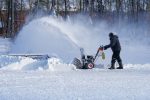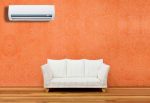Planning to buy a leaf blower? Here’s what to look for
Autumn season changes the surroundings’ whole scenery, turning every corner into yellow, orange, and brown. Although this season brings exceptional beauty to the landscape, falling leaves may bring a whole level of inconvenience to some homeowners. With a ton of leaves splattered around your garden, it is so much hassle to clean all of it just by sweeping. In that case, a leaf blower could do a short task of cleaning up the mess. And it’s not just a seasonal landscape machine; it’s useful all year round. Leaf blowers are convenient for sweeping summer sandy decks and soft snow in winter, as well as dusty walkways and porches.

There are numerous leaf blowers on the market, like gasoline, corded electric, and battery-powered. They also come in a range of styles, from handheld units to backpacks and wheeled versions. What kind of leaf blower you need depends on how much work needs to be done and your preferences.
To help you decide, here are some of the things to look for when buying a leaf blower:
High-Quality features
Using a decent leaf blower or vacuum would make dealing with autumn leaves a breeze. However, a poor one will struggle to clear them at all. The following features will make all the difference. So make sure to consider all of these when buying a leaf blower.
- Narrow nozzle for blowing – Look for a unit with a small or narrow nozzle to direct the airflow and the ability to regulate the speed of the air jet.
- Compactible – Leaf blowers would have to be stored hidden for most time of the year. dIf you have limited storage, find a unit with a telescopic nozzle or one that can be quickly disassembled.
- Comfortable handles and shoulder straps – Opt for a gentle grip handle with a padded shoulder strap.
Features such as flared and swivelling nozzles certainly make it easier to shepherd leaves into a tidy pile, and many blowers or vacuums provide no-tool nozzle adjustment. Being knowledgeable of these choices will help you pick the appropriate blower for you.
Speed
When it comes to evaluating leaf blowers for efficiency, the most significant specifications to look for are MPH and CFM numbers. Both CFM or MPH measuring units represent the level at which the air leaves the vent. CFM stands for cubic feet per minute, which corresponds to the actual amount of air that travels, while the MPH measurement we’re all familiar with means the miles per hour of air that exits the tube.
The higher the CFM and MPH, the better the blower would be to eliminate damp leaves, heavier debris, and leaves and twigs stuck in your lawn. As stated in https://www.essentialhomeandgarden.com/best-gas-leaf-blower/, a handheld unit with an output of 470 CFM and 170 MPH of airflow is perfect for residential use and even for commercial applications. So make sure to check the CFM and MPH of the equipment before buying one.
A Neighbourhood friendly Leaf Blower
If you live in a neighbourhood that doesn’t like noise emissions and frowns on the loud noise, you might want to consult them first before considering buying a blower. Some areas in California forbid the use of any blower. At the same time, certain communities have time-based limits, with the most frequent inappropriate periods between 9:00 pm. and 8:00 am. Generally speaking, the heavier the equipment, the more noise it can create, though the better it will perform. A good rule of thumb, electric is quiet, fueled is noisy, and the larger the engine, the more noise it generates.

Equipment maintenance
Electric blowers require less maintenance. Wiping them down and watching out for the debris particles build-up on the air intake are the things you should do to maintain it. If you use a mulcher, removing tiny leaf particles from the bag and blower will do.
Gas-powered blowers need a tune-up every year or two, and you’ll need to have the gas on hand, of course. Fueled blowers are the most effective equipment for handling leaves. However, they’re still the loudest, and they need the most maintenance.
Walk-behind blowers have more moving components, so they also need more maintenance. Still, the typical leaf blower would not need as much care as a lawnmower or related lawn equipment.

To top it all, choosing the best leaf blower comes down to your terrain, yard size, and budget. Both gas and electric versions take a lot of work out of raking off fallen leaves and other yard and driveway clutter. If you’d like to do some more research on them, have a look at Thebestleafblowers.com to find out more information. Before buying one for your home, make sure to research the specific equipment that you prefer. You can also ask for professional help to know which unit is compatible with your yard.
![[AD] We went to the newly opened Cha Sha Kingston a couple of weeks ago, and wow — taste bud adventure unlocked! The boys devoured the masala fries and chicken tikka rolls, while we couldn’t get enough of that epic kebab butter curry 😍🍛.
It’s amazing value for food this tasty (and everyone left happy and VERY full!).
Delicious food, vibrant vibes and incredible value — the perfect combo for your next meal.
📍Cha Sha Kingston
43 Surbiton Road, KT1 2HG
🌐 chasha.co.uk
Other Cha Sha locations in Birmingham, Ilford, Southampton and Wembkey
#ChaSha #ChaShaKingston #KingstonEats #FoodieFinds #UKFoodie #FoodReview #KingstonUponThames #FamilyEats #FamilyDining #FoodieKids](https://suburban-mum.com/wp-content/uploads/2016/02/574770541_18560351146016840_6855048070839528040_n-180x320.jpg)

![[AD] We’re a cricket-mad family, so we’re buzzing that @thehundred is back this August! 🏏🔥
To get ready, M tried out the official FREE Activity Pack — and it’s brilliant! 🙌
Packed with fun games, creative challenges and sporty tasks, it’s perfect for getting kids hyped whether you’re at home or on the go.
👉Download yours now (link in bio)
@londonspirit @ovalinvincibles #EveryMomentCounts #TheHundred
#EnglandCricket #CricketFamily #TheHundredCricket #LondonBloggers #Cricket #CricketIsLife #kidsfun](https://suburban-mum.com/wp-content/uploads/2022/11/505472555_18531279601016840_7092520074819907569_n-180x320.jpg)



![[AD - Press visit]
We enjoyed the glorious sunshine this weekend with a trip to Brighton. We went on the @brightoni360official which is right by the sea front.
The i360 pod take a slow journey up, allowing you to take in views across Brighton and the South Downs 450ft above ground. There’s a bar inside with drinks and snacks available to purchase and the experience lasts 25 minutes.
Afterwards, we headed to the open air roller rink for a roller skating session!
The roller rink is:
⭐ Suitable for over 5s
⭐ £6.50 if you have your own skates or £9.50 if you need to hire them
⭐ 45 minutes per session
Full details to visit the i360 + skating
📍 Brighton i360, Lower Kings Road, Brighton BN1 2LN
🚗 Parking nearby (we parked in the Regency Square Car park)
🎟️ Prices start from £25.40 for an adult and £16.90 for a child
🕐 Opening hours are currently Sun-Fri 10.30am-18.30pm and until 19.30pm on Saturdays
☕️ Bar inside the i360, cafe and gift shop
Book tickets here:
https://tickets.brightoni360.co.uk/tickets/?_ga=2.195305772.1869001490.1689671753-1757164059.1689671753/#events?eventid=157](https://suburban-mum.com/wp-content/uploads/2015/04/417980235_313576471048632_3682382982231216432_n.jpg)

![[AD] ***Summer of fun at Barracudas Activity Camps!****
There is plenty for kids to do at @barracudas_activity_day_camps
From Tennis, Archery, Swimming, Motor Sports and more you can be sure that there will be something for kids aged 4.5-14. ⚽🏈🥅🎾🏓🏎️🏹🏊♂️🏉
You can book on a day by day basis - so it can fit in with any other days out/activities you have planned and there are early drop off and late pickup options available. Barracudas are also Ofsted registered so you can use your Childcare Vouchers too.
⭐⭐⭐Get £20 off a week or £4 off a day using my discount code: MARIA20⭐⭐⭐
#BarracudasActivityDayCamp #BarracudasActivityCamp #BarracudaAmbassadors #SummerHolidays #SchoolHolidays #Summer2023 #SummerCamp #DayCare #Camp #KidsCamp #surreymummy #surreymums #SummerOfFun #ActivityCamps #HolidayCamps #Childcare #SchoolHolidays #schoolholidaycamps](https://suburban-mum.com/wp-content/uploads/2024/07/353583570_625625966167953_545896259645102575_n.jpg)



![[AD] We have some super exciting news...we have been chosen to be Laser Quest Ambassadors, and the boys are over the moon!
We are really lucky that our local Laser Quest (@laserquestkingston) is just around the corner from us. It means we can pop in of a weekend or anytime during the school holidays, and with summer just around the corner, I know Laser Quest will be one of our go-to places for some family fun.
As well as games of Laser Quest, there are also VR experiences and arcade amusements too. To find out a bit more about how Laser Quest works, you can read my blog post: https://www.suburban-mum.com/laser-quest-kingston/ (clickable link in bio)
Don't forget to keep an eye out for our Laser Quest posts - I'm going to be giving away two family passes to use at Laserquest Kingston!
If you can't wait and want to head down to Laser Quest to try it out, use the code SUMMER30 for 30% off your booking. The code is valid from now until the end of August 2023 and can be used on Laser Quest games and birthday party bookings.
#LaserquestAmbassador #Laserquest #LaserquestKingston #ActivitiesForKids #FamilyFun #DaysOutWithKids #Lasertag #LaserquestVR #Kingston #ThingsToDoInKingston #SurreyFamilyDaysOut #ThingsToDoWithKids #RainyDayFun #SurreyMummy #SurreyLife #LifeWithKids #LifeWithBoys #familyfunday](https://suburban-mum.com/wp-content/uploads/2015/04/353230107_797358078406942_2405522556733455165_n.jpg)

![[AD] The sun has finally made an appearance and the boys have been making the most of it by spending it
in the garden.
They’re go-to is always football and they’ve been trying to improve their aim and accuracy with the new Messi Foldable Footlball goal from the #MessiTrainingSystem range.
I love the fact the goal is foldable, making it easy to store away when not in use. It is also lightweight so you can effortlessly pack it up and take it to the park or to a friend’s house.
The Messi Foldable Football Goal retails at £36 and can be purchased from @argos
You can read my full review here: https://www.suburban-mum.com/messi-foldable-football-goal/
#TrainLikeMessi #FoldableFootballGoal #FootballSkills #OutdoorFun #LionelMessi #LeoMessi #FootballAtHome #OutdoorKids #JustGetOutside #OutdoorsAndFree #ScreenFreeKids #WhateverTheWeatherKids @flair_gp](https://suburban-mum.com/wp-content/uploads/2015/04/341194882_615024710178056_41977149395989448_n.jpg)

![[AD] We are absolutely thrilled to announce that we are Barracuda Ambassadors again this year.
With Easter just around the corner, the boys were sent the @barracudas_activity_day_camps new camp kit in preparation for the school holidays.
There’s a wide range of activities for kids aged 4.5 - 14 including Tennis, Archery, Basketball, Arts & Crafts and more.
If you like the sound of Barracudas, find out more over on their website. You can also save £20 a week or £4 a day, using my discount code: MARIA20](https://suburban-mum.com/wp-content/uploads/2024/07/336812306_765234558514317_685553691647241974_n.jpg)


![[AD - Gifted]
Last weekend we were invited to try out @tsarettaspice’s new Bottomless Brunch menu and I can tell you it was thumbs up all round!
There’s a good choice tapas on offer from Punjabi fish fingers, Indo Chinese Chicken to Spiced Lamb Scotch Eggs and Manchurian Cauliflower (which was amazing!)
If you’re local to Twickenham and fancy giving them a try here’s are the details.
Tsaretta Spice Bottomless Brunch
⭐️£37.50 per head for bottomless Prosecco or cocktail of the day
⭐️£55 per head for bottomless Champagne
⭐️ Food included: 4 tapas selections and dessert or 2 tapas selections, a pav or naanwich and dessert
⭐️ Non-alcohol brunch is also available
Tsaretta Spice
55 Church Street
Twickenham
TW1 3NR
You can also read our full review over on the blog (link in bio)](https://suburban-mum.com/wp-content/uploads/2024/07/334565436_5960402314015030_663031098700829518_n.jpg)



